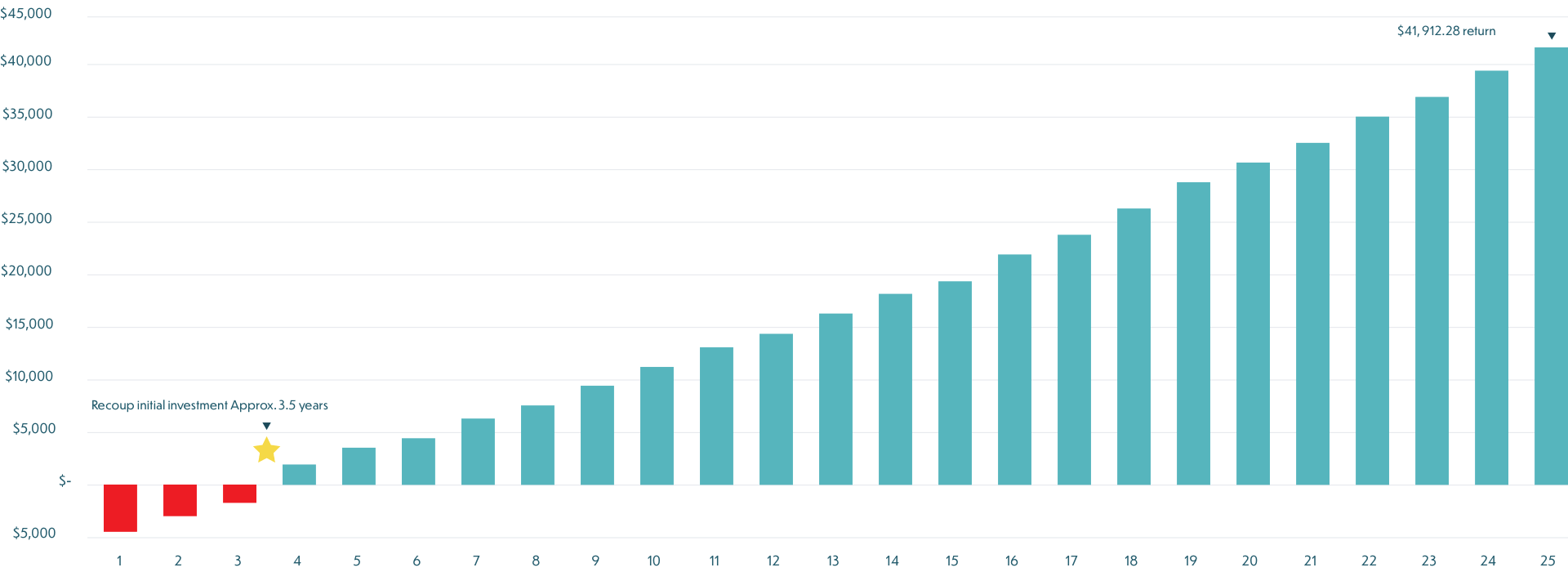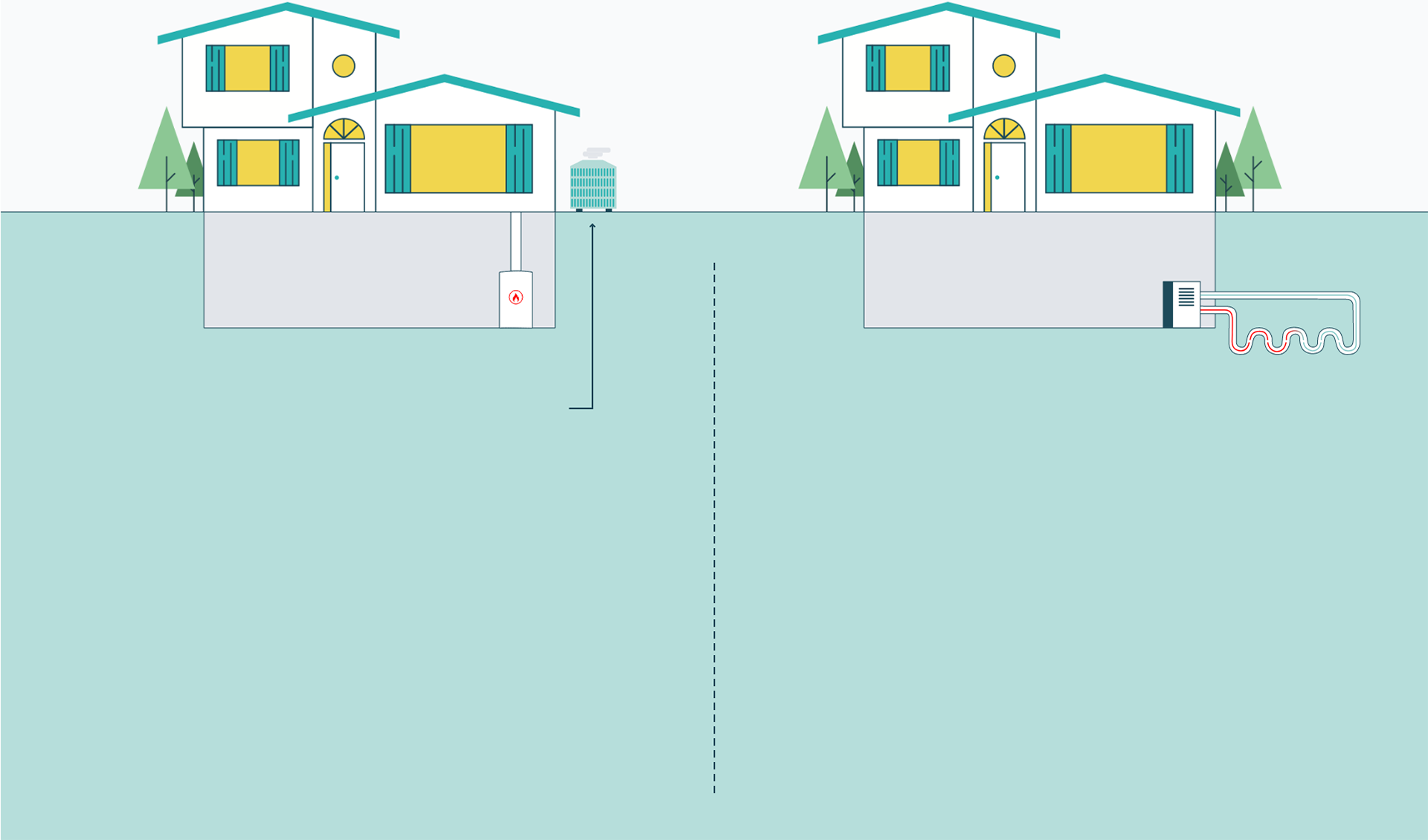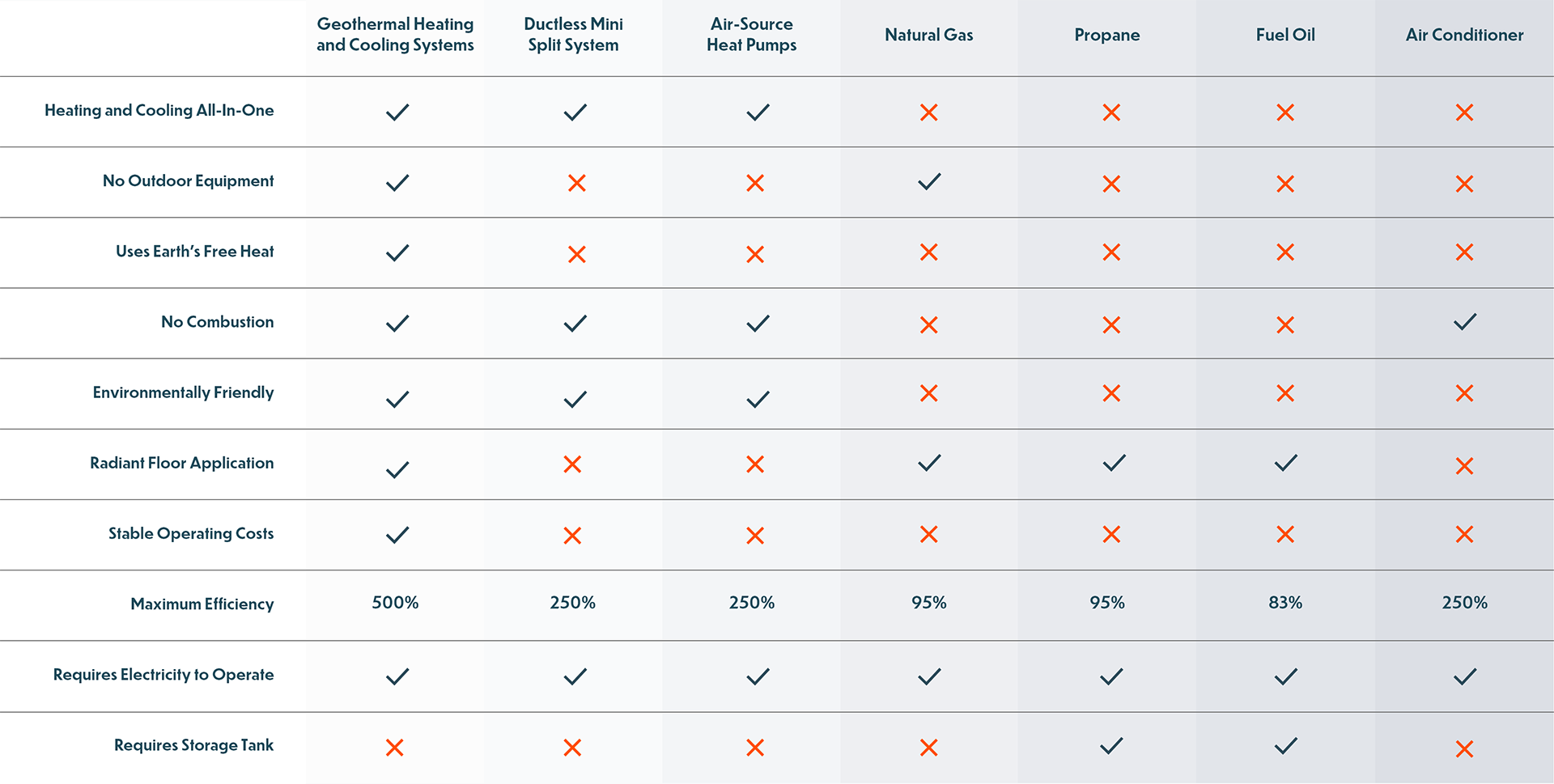Is geothermal a good fit for me? Is geothermal a good fit for me?
Is geothermal a good fit for me? Is geothermal a good fit for me?
Comfortable
Geothermal systems run at lower speeds for longer periods of time, keeping your home at a consistently comfortable temperature and humidity level all year without hot or cold spots.


Affordable
Geothermal pays for itself in just five to seven years with up to 70% savings annually on heating and cooling costs. And all geothermal installations receive a 30% energy tax credit through 2032.


Renewable
Geothermal is renewable and doesn't burn fossil fuels, so there are no CO2 emissions. Switching from conventional heating and cooling is the environmental equivalent of planting 750 trees (1 acre of trees).


What you'll love about geothermal.

The most
efficient heating and cooling
system on earth

Without an outdoor
unit, it's engineered to
be as quiet as possible

Consistent temperature
year-round

The most
environmentally
friendly system

Low maintenance

Freedom from fossil fuels

Extremely durable.
Ground loops last as
long as 100 years; indoor
units up to 25 years
How geothermal pays for itself.
Geothermal is so efficient it pays for itself in as little as 3.5 years. For many homeowners, the monthly cost of financing a new system and your new energy bill is less than what you’re currently paying with traditional HVAC.
Investment

Conventional HVAC vs. Geothermal
Geothermal systems perform with greater efficiency during severe temperature fluctuations outside, and require only one unit to heat and cool your home.

No CO2
Conventional systems use a gas furnace which produces CO2, a substance that is not only harmful to the environment, but can pose a safety risk to you and your family.
Peace & Quiet
Conventional systems use a noisy outdoor unit to exchange heat with the environment. Geothermal systems are quiet, using underground pipes for the heat exchange. And since the unit is placed indoors, it's protected from the elements and lasts longer.
Earth's Natural Temperature
Geothermal systems use the earth's thermal energy to heat and cool your home quietly and efficiently.

Peace & Quiet
Conventional systems use a noisy outdoor unit to exchange heat with the environment. Geothermal systems are quiet, using underground pipes for the heat exchange. And since the unit is placed indoors, it's protected from the elements and lasts longer.
No CO2
Conventional systems use a gas furnace which produces CO2, a substance that is not only harmful to the environment, but can pose a safety risk to you and your family.
Summer
As temperatures outside increase, a traditional AC system has to work harder, creating more expense.
Winter
When temperatures drop outside, a furnace or boiler has to consume more fossil fuels to compensate for the temperature difference.

Earth's Natural Temperature
Geothermal systems use the earth's thermal energy to heat and cool your home quietly and efficiently.
Summer
In the summer, a geothermal system collects heat from your home and moves it to the much cooler earth.
Winter
During the winter, it draws from much warmer underground temps, making it that much more efficient.

What geothermal owners say
"After tax credits, geothermal was only $2000 more than a top-of-the-line propane furnace with air conditioning installed. It cut my energy bills in half and made it way easier to afford the payments. Not to mention not having to buy propane. I wouldn’t trade my geothermal system for anything."
"We had a really, really cold January and our total electric bill was only $130.00. That was for everything in the house. And the unit is super quiet."
"We love the comfort our geothermal system offers. Last week, when we turned the system on, it felt much better within 10 minutes, and it felt great within 15 minutes."
"Because of our lower heating and cooling bills, we expect to break even on the system in five years. It’s clean and quiet, and we have even heat throughout the house. Bottom line – a geothermal system is more efficient in the long run. It’s the most important investment in our home."
"Along with the low operating cost, we like the comfort levels. Our previous home was gas heating and we always seemed to have cold and hot spots. Our new house is more evenly heated and cooled."
"It is extremely energy efficient and quiet; you can’t hear it operate. It also makes us feel secure, knowing that a geo unit has no combustion process that could fail and create carbon monoxide. Just clean, efficient comfort for our family."
"I purchased a geothermal system for my 100-year-old farmhouse. It’s been three years now and I wouldn’t trade it for anything! Prior to this, I had a boiler and air conditioner, but I spent $1,500 to $2,000 in propane a year and had high electric bills all year long. Now, no propane and lower electric bills. This unit has paid for itself and is a wonderful investment in not only my family’s future, but I feel the planet, as well! I recommend it to everyone I can!"
In the press
"Geothermal doesn't begin to describe the wonders of what heat pump technology can do for the home and the planet."
"Geothermal energy, often called "the forgotten renewable," doesn't create emissions, unlike fossil fuels. Because it uses heat radiating from the earth's core, it's considered renewable, with a supply whose lifetime is equal to the Earth's."

"What is Geothermal? A genius way to heat and cool your home."

"Geothermal heat pumps might be more costly to install than regular heat pumps but they can produce visibly lower energy bills."
Things to keep in mind
Geothermal systems cannot be installed in individually-rented apartments or condominiums. You must own the property and have yard space.
Please exercise the same due diligence as you would with any major home improvement project – get references from prospective installers and if possible, get multiple quotes.
Make sure your installer does some energy modeling on your home. If the house is poorly insulated, it can have a big effect on system performance and payback.

ClimateMaster
ClimateMaster has been building heat pumps since humans launched the first satellite into space over 60 years ago. Our tenure makes us the most advanced and efficient heat pump brand in the world. Because of that, we can offer equipment, service, support, and geothermal education second to none. We’re so confident, our geothermal system designers will show you exactly how ClimateMaster heat pumps line up next to other heating and cooling options unique to your home. The results will speak for themselves. Visit ClimateMaster today for the ultimate in geothermal heating and cooling.
- Highest Certified Efficiency: Our Trilogy 45 has the lowest energy bills of any heat pump on the market today
- The Most Accurate Home Energy Analysis Available: The newly released GeoDesigner 4 software takes the guesswork out of geothermal sizing and pairs you with the perfect heat pump and ground loop for your home
- Excellent Financing Options: Zero money down with available partner financing, federal rebates, and local utility incentives (based on state)
- Substantial Cost Savings: ClimateMaster geothermal has saved customers thousands of dollars a year in energy bills
- 100% Satisfaction Guarantee: The Trilogy series heat pumps ensure complete peace of mind
- Local Service and Support: Work with local geothermal experts to ensure proper system sizing and installation

WaterFurnace
We’re on a mission to transform the way Americans use energy, protect resources for future generations, and give people the freedom to focus on life. We’re currently providing visitors from this site with access to a Geothermal Concierge – a human resource whose only job is to support your needs and make sure you’re completely confident in choosing geothermal. It’s a complimentary service that’s available to only a select group. If you’re ready to liberate yourself from fossil fuels and claim the clean, renewable energy sitting in your own back yard, choose WaterFurnace.
- Chosen by homeowners more than any other geothermal brand
- The nation’s largest dealer network and most complete geographic coverage
- Access to a Geothermal Concierge – a complimentary resource that can answer questions, provide guidance, or help you get an estimate from local contractors
- Access to our exclusive GeoPro Master Dealers – a tier of elite contractors who commit to a higher level of training, technical expertise, and customer satisfaction
- Access to Symphony – the most advanced cloud platform in the HVAC industry, which provides remote monitoring, control, and service capabilities from any online device

Enertech
We’ve been a people-centric company since 1996. People come first. That’s why we’ve taken homeowner feedback and engineered award-winning geothermal systems that benefit families beyond energy efficiency and cost savings. We believe in quality craftsmanship and loyalty. Our geothermal systems are proudly built in the heart of America in Mitchell, South Dakota, to the highest standards of quality control, and backed by the best warranties in the industry. So when you join the Enertech family, you can expect our dedication in making sure your system keeps your family comfortable for its full extended life.
- All units hand-built and passed through our state-of-the-art testing station
- Industry-leading warranties covering critical components up to 18 years from installation date
- Units come stock with an all-aluminum microchannel air coil which significantly improves efficiency, dependability, and system life
- The widest variety of geothermal systems in the industry
- Access to flexible financing with many options for zero money down
- Units are insulated with UL GREENGUARD Gold-Certified cabinet insulation, resulting in quiet yet optimal performance
- In-house design and technical services department ensures that every dealer and installer provides top-tier knowledge and value
Get more information and schedule an energy audit on your home
Interested in taking the first step? We’ll send you an email which will help you compare quotes and how much money you’ll save, including tax credits. You can then schedule an appointment with an energy consultant to find out if your home qualifies for a geothermal system. Learn more abut the leading geothermal manufacturers below:


